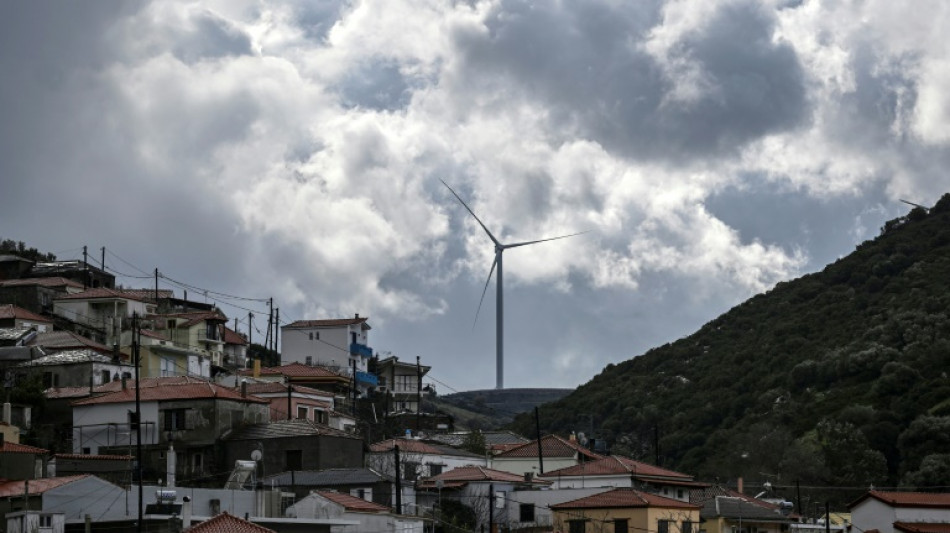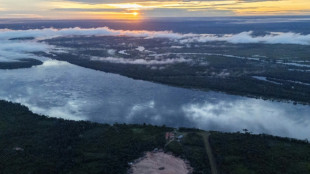

Turbine 'torture' for Greek islanders as wind farms proliferate
Until a few years ago, Agii Apostoli was a picturesque seaside village on the eastern coast of Evia, drawing a modest income from tourism and fishing.
Now it is ringed by towering wind turbines whose night lights and whirring sounds are tantamount to daily "torture", locals say.
"Longterm visitors ask us, why did you allow this crime to take place?" laments Stamatoula Karava, a local employee involved in a local cultural association.
With their aviation lights flashing through the night in the surrounding hills, the turbines "have completely ruined the view," she says.
Evia, 80 kilometres (50 miles) east of Athens and Greece's second largest island after Crete, was among the first of the country's regions to host wind farms some two decades ago.
But they have since mushroomed, mainly in the more sparsely populated south of the island, environment groups say.
The municipality of Karystos alone, with an area of 672 square kilometres, has more than 400 turbines, some of them along the area's main road.
The oldest ones have now fallen into disuse, yet there are no plans to remove them and recycle their parts, says Chryssoula Bereti, who chairs the Karystos anti-wind farm front.
"It's a scandal," she fumes.
In line with EU clean energy targets, Greece has reduced its once-overwhelming reliance on lignite for electricity production to around 10 percent currently.
Forty percent of Greek power plants are now gas-fired and 30 percent run on renewable resources, of which 18 percent are wind turbines.
Hydroelectric plants and imports account for the remainder.
According to the Regulatory Authority for Energy (RAE), Greece's power production watchdog, the maximum capacity of wind turbines in the country increased more than sixfold between 2019 and 2021 to 8,205 MW.
With its propensity for high winds, Evia is a natural location for wind farms, notes RAE chairman Athanasios Dagoumas.
But critics say that this expansion has gone too far.
"Wind turbines have been installed on mountain peaks, in forests, near archaeological sites, on islands, in protected habitats... it's as if energy production is the only possible activity in this country", says Dimitris Soufleris, a lawyer and spokesman of the environmental association of the Evia town of Kymi.
"We cannot have so many wind farms in Greece," he told AFP.
- 'We can't sleep' -
In past months, protests against wind farm development have been held in Agrafa, central Greece, as well as the islands of Andros, Skyros and Tinos.
Soufleris notes that another 18 turbines are scheduled to be installed near Agii Apostoli.
Nikos Balaskas, a local engineer whose house in Agii Apostoli is less than 400 metres (450 yards) from the nearest wind turbine, has sued the company.
"As an engineer, I'm not opposed to green energy. But there have to be standards. This is torture, we can no longer sleep for the noise," he said.
There are similar concerns in the nearby coastal town of Styra, where another 14 wind turbines are to be located.
"This is going to cause enormous damage to our region," says local hotel chairwoman Afroditi Lekka, noting that thousands of hikers visit the area annually.
In response to the mounting criticism, the conservative government of Prime Minister Kyriakos Mitsotakis last month announced that six mountain ranges in central Greece, the Peloponnese, Crete and the island of Samothrace would be given additional protection status against future energy infrastructure development.
"Planned licences in these areas were withdrawn," says RAE's Dagoumas.
Similar steps have also been taken in the north of Evia, which was devastated by wildfires this summer, he adds.
RAE's Dagoumas notes in the past two years solar parks have overtaken wind farm investments owing mainly to "the implementation of a new automatic system" that facilitates the application for the investors and lower average cost.
"The wind farms cannot been implemented everywhere, it has to be high wind capacity, for the photovoltaics there is much more space for them", he says.
K.Cairstiona--NG



